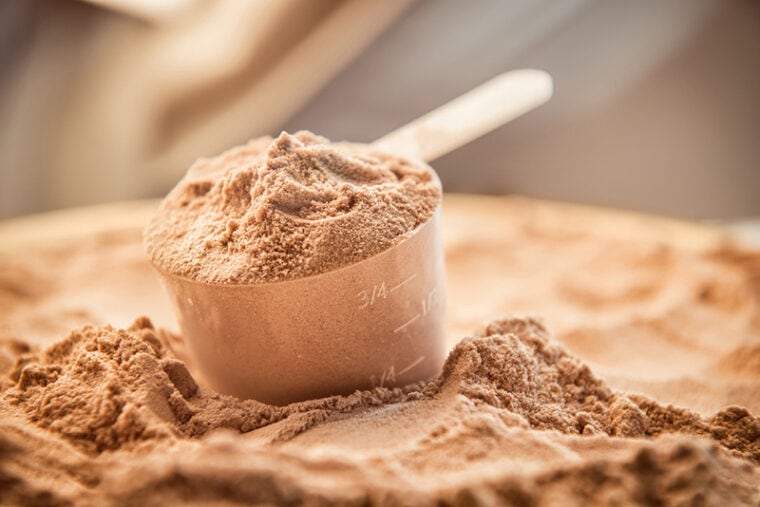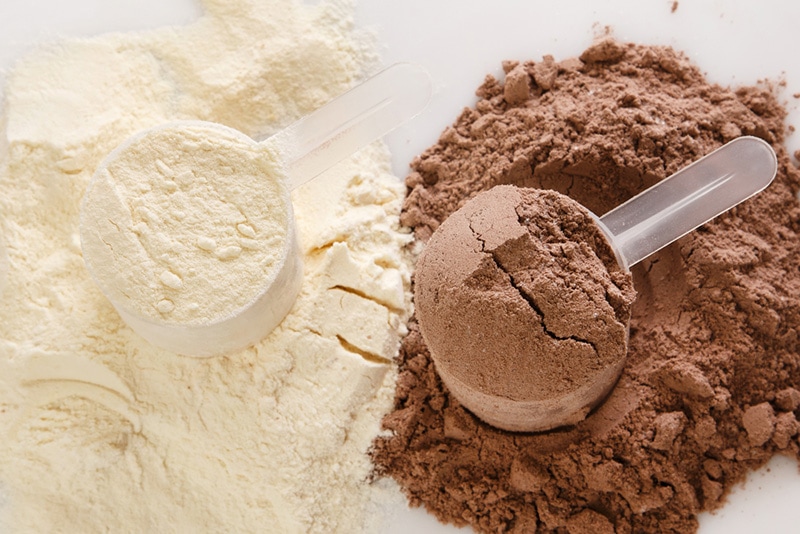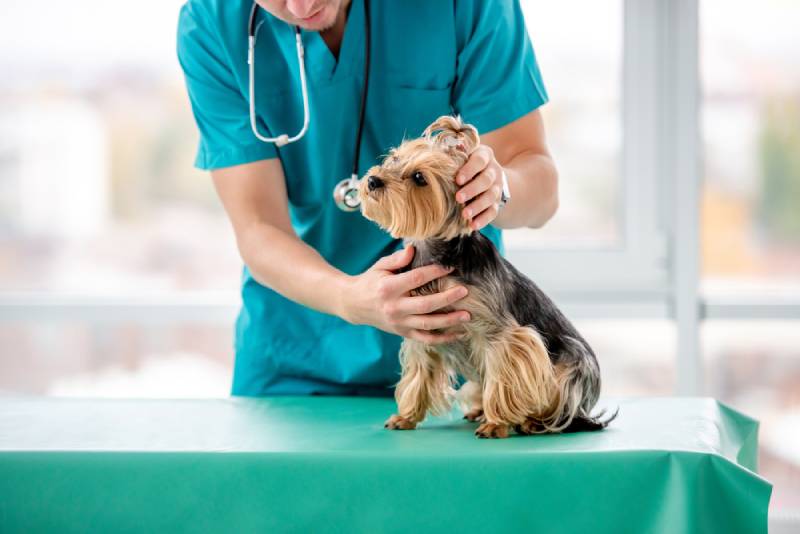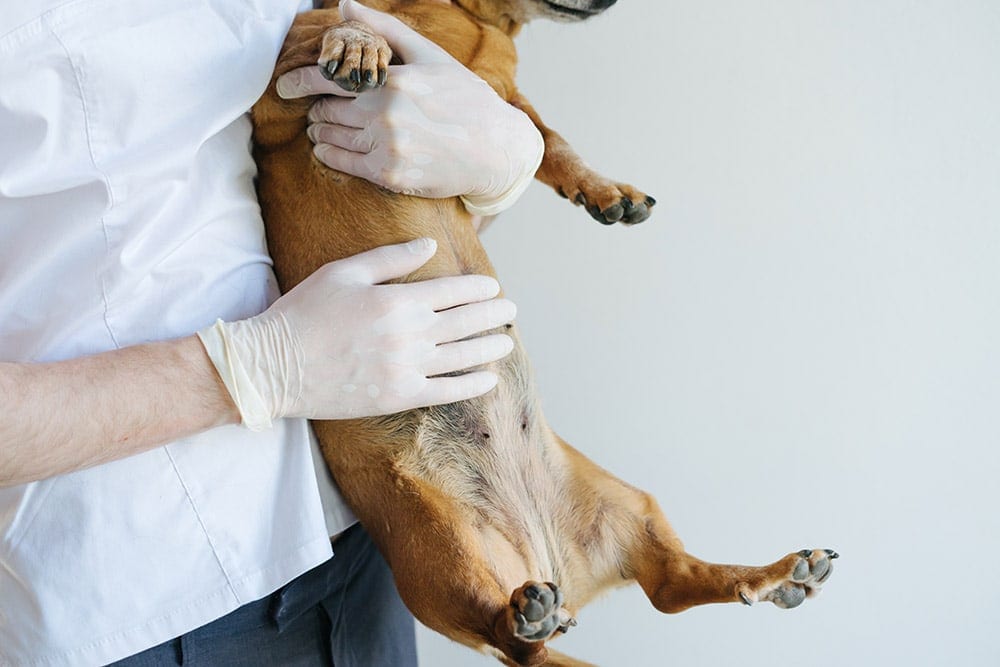
Click to Skip Ahead
Although dogs are omnivores and need plenty of protein in their diet to be healthy, there is such a thing as too much protein too. Dogs should not eat protein powder designed for humans. In this article, we’ll discuss how much protein dogs need to stay healthy and why you should avoid serving them protein powder.
Protein Supplements and Your Pet
Your pet’s best chance at having a healthy life is a well-balanced diet of quality protein, fat ,carbs, vitamins and minerals. There are specifically formulated diets for dogs at different stages of life and with different medical conditions which will provide the ideal nutrition for your pet.
Protein powders designed for human consumption, such as whey protein powder, contain ingredients that could be harmful or even toxic to your pet. Many dogs are lactose intolerant and the lactose in whey protein can cause digestive upsets in high enough quantities. Unflavored protein powder from peas, whey or collagen is unlikely to cause an adverse reaction in dogs if they eat a small portion, but chocolate formulas or artificial sweeteners such as xylitol, are toxic and can make them very unwell. It’s best to keep the protein powders and all other supplements away from your pet unless your vet recommends them.

How Much Protein Does a Dog Need?
It’s recommended that dogs get the following amounts of protein at different stages of their life. The Association of American Feed Control Officials makes the following recommendations for the percentage of protein that a dog should get in their diet;
If you’re still unsure about the correct amount of protein to give your pet, it’s best to contact your vet for recommendations
In older dogs, protein metabolism can be complicated by the presence of multiple diseases. Healthy older dogs may benefit from more protein in their diet, as their requirements increase, but it’s best to speak with your veterinarian before changing anything.
Calcium: Phosphorous Ratio
Meat is commonly used in diets as a protein source however, meat is generally lower in calcium and higher in phosphorus which binds to calcium. Meat only diets lead to problems with bones, gut and muscles due to a relative lack of calcium. Dogs are omnivores and need both meat and vegetation in their diets.

What Factors Can Affect How Much Protein My Dog Needs?
While there are guidelines as to how much protein dogs need, every dog is an individual with their own needs. Some factors affect how much protein a dog needs, and we’ll discuss a few of them below.
Age of the Dog
The age of your dog plays a role in determining how much protein they need. As you can see from the table above, growing puppies need more protein than an adult dog does. However, it is essential to your dog’s balance protein intake and exercise to avoid weight gain and obesity.

Activity Level of the Dog
If you have a working dog such as a Border Collie that herds sheep or a Husky pulling a sled, they probably use a lot of energy. These dogs need higher amounts of energy than other dogs do, which can be supplied in part through increased protein.
Pregnancy
In the third trimester of pregnancy and during lactation, female dogs will have higher calorie and protein requirements and should be fed diets with calorie and protein requirements designed for growth. In addition, make sure the diet is not a restricted calcium diet such as a large breed puppy food.
Health Conditions the Dog Has
Some health conditions that affect dogs, such as chronic kidney disease, can lead vets to recommend serving food with less protein. Prescription diets are often necessary to provide dogs with the appropriate protein, fat, vitamin, and mineral levels.

Excellent Sources of Protein for Your Dog
As with anything else, it’s best to talk to your vet if you decide to adjust your dog’s protein levels. Here is a list of a few of the best sources of protein below.
Frequent Asked Questions
We’ll answer a few of the most common questions about dogs and protein in the section below.
My Dog Has a Sensitive Stomach, Can They Tolerate a High-Protein Diet?
Dogs with sensitive stomachs on high-protein diets can often end up with diarrhea and even digestive issues. A high protein diet may not necessarily be beneficial for your dog. You should speak with your veterinarian about the best diet for your dog.

What Are the Signs of Protein Deficiency in Dogs?
Dogs can have protein deficiencies, though this rarely happens. Here are the signs that indicate a protein deficiency but they are more likely to indicate underlying illness rather than insufficient intake if your dog is eating quality pet food.
If you see any of these signs in your pet, contact your veterinarian.
Wrap Up
If your dog eats a bit of your protein powder, check the ingredients for anything harmful such as chocolate, cocoa or xylitol and contact your veterinarian if they are present. However, if they eat quite a large portion of protein powder, call your veterinarian for further instructions.
Featured








